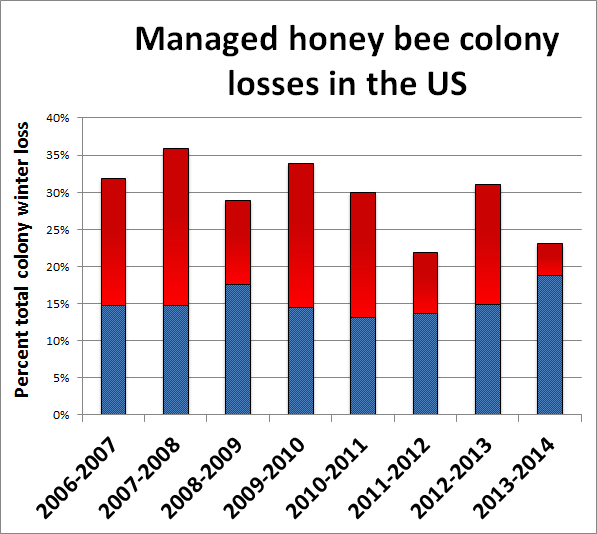Preliminary Results: Honey Bee Colony Losses in the United States, 2013-2014
May 6, 2014
Dennis vanEngelsdorp1*, Nathalie Steinhauer1, Karen Rennich1, Michael Wilson2, Kathy Baylis3, Dewey M. Caron4, Keith S. Delaplane5, Jamie Ellis6, Kathleen Lee7, Eugene J. Lengerich8, Jeff Pettis9, Robyn Rose10, Ramesh Sagili4, John Skinner2, Angela M. Spleen8, David R. Tarpy11, Dominic Travis7, James T. Wilkes12 for the Bee Informed Partnership.
Note: This is a preliminary analysis. A more detailed final report is being prepared for publication at a later date.
The Bee Informed Partnership (https://beeinformed.org), in collaboration with the Apiary Inspectors of America (AIA) and the United States Department of Agriculture (USDA), is releasing preliminary results for the eighth annual national survey of honey bee colony losses. For the 2013/2014 winter season, 7,183 beekeepers in the United States (U.S.) responded. Collectively, they managed 564,522 colonies in October 2013, 21.7% of the country’s 2.6 million colonies.
For the winter of 2013/14, 23.2% of managed honey bee colonies in the U.S. died. Nearly two-thirds of the respondents (65.4%) experienced winter colony loss rates greater than the average self-reported acceptable winter mortality rate of 18.9%. The 2013/14 winter colony loss rate of 23.2% is 7.3 points (or 23.9%) lower than the previous years’ (2012/13) estimate of 30.5% loss. (Figure 1) and is notably lower than the 8-year average total loss of 29.6% .
Preliminary results for the 2013/14 survey indicate that 20.0% of all colonies managed between April 1 2013 and Oct 1 2013 died. Responding beekeepers who managed bees over the entire April 2013 – April 2014 survey period reported losing 34.2% of the 670,568 colonies managed over this period. The annual loss differs from the sum of summer and winter losses reported above because the respondent pool differed as only respondents who reported for both the summer and winter period are included in the annual loss rate calculation.
The 2012/13 survey expanded beyond only winter mortality estimates to improve our understanding of colony losses by also reporting on summer and annual colony mortality rates. Results from the 2012/13 survey indicated that that summer colony losses (between April 1 2012 and Oct 1 2012) were 25.3%. Loss estimate for the 12-month period (between April 1, 2012 and March 30, 2013) was 45.2%.
This survey was conducted by the Bee Informed Partnership, which receives a majority of its funding from the National Institute of Food and Agriculture, USDA (award number: 2011-67007-20017).
1. University of Maryland, dennis.vanengelsdorp@gmail.com, 717-884-2147
2. University of Tennessee
3. University of Illinois
4. Oregon State University
5. University of Georgia
6. University of Florida
7. University of Minnesota
8. The Pennsylvania State University – Hershey
9. USDA-ARS Bee Research Lab
10. USDA Animal and Plant Health Inspection Service
11. North Carolina State University
12. Appalachian State University
*Corresponding author
1. Based on NASS Honey report 2013 figures
2. Previous survey results found a total colony loss in the winters of 30.5% in the winter of 2012/2013, 21.9% in 2011/2012, 30% in 2010/2011, 34% in 2009/2010, 29% in 2008/2009, 36% in 2007/2008, and 32% in 2006/2007 (see figure attached)
